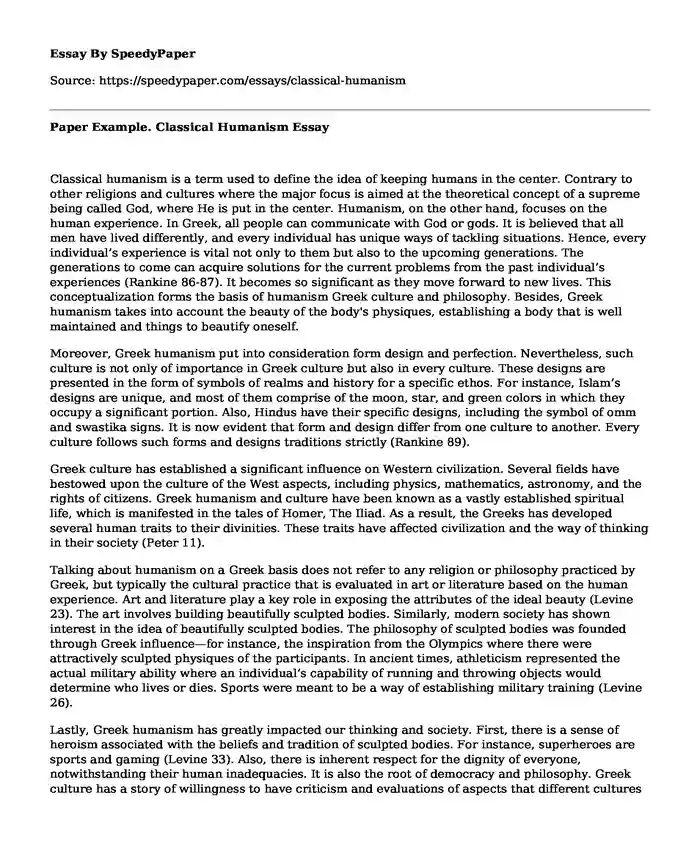
| Type of paper: | Essay |
| Categories: | Philosophy Human Ancient Greece |
| Pages: | 3 |
| Wordcount: | 683 words |
Classical humanism is a term used to define the idea of keeping humans in the center. Contrary to other religions and cultures where the major focus is aimed at the theoretical concept of a supreme being called God, where He is put in the center. Humanism, on the other hand, focuses on the human experience. In Greek, all people can communicate with God or gods. It is believed that all men have lived differently, and every individual has unique ways of tackling situations. Hence, every individual’s experience is vital not only to them but also to the upcoming generations. The generations to come can acquire solutions for the current problems from the past individual’s experiences (Rankine 86-87). It becomes so significant as they move forward to new lives. This conceptualization forms the basis of humanism Greek culture and philosophy. Besides, Greek humanism takes into account the beauty of the body's physiques, establishing a body that is well maintained and things to beautify oneself.
Moreover, Greek humanism put into consideration form design and perfection. Nevertheless, such culture is not only of importance in Greek culture but also in every culture. These designs are presented in the form of symbols of realms and history for a specific ethos. For instance, Islam’s designs are unique, and most of them comprise of the moon, star, and green colors in which they occupy a significant portion. Also, Hindus have their specific designs, including the symbol of omm and swastika signs. It is now evident that form and design differ from one culture to another. Every culture follows such forms and designs traditions strictly (Rankine 89).
Greek culture has established a significant influence on Western civilization. Several fields have bestowed upon the culture of the West aspects, including physics, mathematics, astronomy, and the rights of citizens. Greek humanism and culture have been known as a vastly established spiritual life, which is manifested in the tales of Homer, The Iliad. As a result, the Greeks has developed several human traits to their divinities. These traits have affected civilization and the way of thinking in their society (Peter 11).
Talking about humanism on a Greek basis does not refer to any religion or philosophy practiced by Greek, but typically the cultural practice that is evaluated in art or literature based on the human experience. Art and literature play a key role in exposing the attributes of the ideal beauty (Levine 23). The art involves building beautifully sculpted bodies. Similarly, modern society has shown interest in the idea of beautifully sculpted bodies. The philosophy of sculpted bodies was founded through Greek influence—for instance, the inspiration from the Olympics where there were attractively sculpted physiques of the participants. In ancient times, athleticism represented the actual military ability where an individual’s capability of running and throwing objects would determine who lives or dies. Sports were meant to be a way of establishing military training (Levine 26).
Lastly, Greek humanism has greatly impacted our thinking and society. First, there is a sense of heroism associated with the beliefs and tradition of sculpted bodies. For instance, superheroes are sports and gaming (Levine 33). Also, there is inherent respect for the dignity of everyone, notwithstanding their human inadequacies. It is also the root of democracy and philosophy. Greek culture has a story of willingness to have criticism and evaluations of aspects that different cultures can not. For instance, both Trojans and Achaeans do have gods on their sides. There is a consultation between leaders, and they weigh everyone’s opinion democratically. On the contrary, the Hebrews write the idea of one God, on their side alone. In summary, the Greek definition of humanism is based on the physical body, heroism, and the dual seeds of both democracy and philosophy (Rankine 94).
Works Cited
Levine, Joseph M. “Humanism and history: origins of modern English historiography.” Cornell University Press, 2019. pp. 23-34.
Peter, Mack. “Humanism and the Classical Tradition.” The Oxford Illustrated History of the Renaissance, 2019, 11.
Rankine, Patrice. “Afterlife: Du Bois, Classical Humanism, and the Matter of Black Lives.” International Journal of the Classical Tradition, vol. 26, no. 1, 2019, pp. 86-96.
Cite this page
Paper Example. Classical Humanism. (2023, Aug 07). Retrieved from https://speedypaper.com/essays/classical-humanism
Request Removal
If you are the original author of this essay and no longer wish to have it published on the SpeedyPaper website, please click below to request its removal:
- Free Essay for You with Journal Article Review Example
- Employee Diversity in School Psychology - Free Essay Sample
- Essay Sample about Nietzsche's Take on the Merits and Demerits of Memories in Life
- Free Essay: Is Black Panther a Good or Bad Movie
- Essay Sample: Understanding Personality Type and Its Relevance to Career Choice
- Most Memorable Moments - Essay Sample
- Essay Sample on Violence against Women in the United States and Afghanistan
Popular categories




